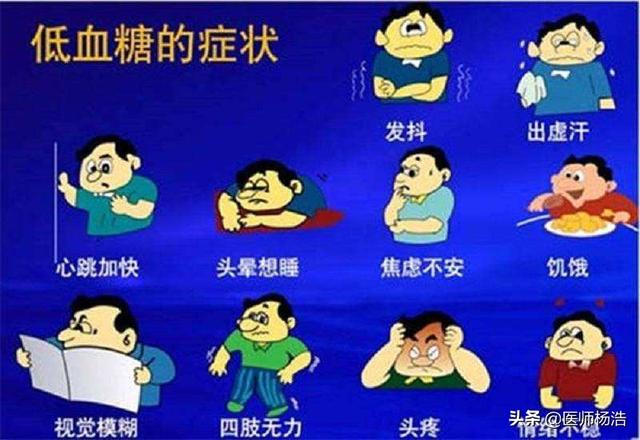Everyone knows about high blood sugar, what are the dangers of low blood sugar?
Low blood sugar has serious consequences until it kills you.
It is true that diabetes caused by high blood sugar, which many people know is bad for us and is a high risk factor for cardiovascular disease, and that the vast majority of people need to control their blood sugar with medication, but there doesn't seem to be as much emphasis on hypoglycemia.

What is hypoglycemia?
Hypoglycemia occurs in diabetic patients:
due toDiabetes is the most common cause of hypoglycemia to occur, and hypoglycemia is extremely harmful to diabetes, so it's important for diabetic patients to simplyBlood glucose less than 3.0 mmol/LIt can be called hypoglycemia. It is important to note, however, that diabetes with symptoms of hypoglycemia and other diseases that have been ruled out, we refer to ashypoglycemic responseAnd so can you.Treat it as hypoglycemia.。
Hypoglycemia occurs in nondiabetic patients:
For people without diabetes.Blood glucose below 2.8 mmol/L can be called hypoglycemia.. Hypoglycemia occurs in people without diabetes in two ways.Fasting hypoglycemiaThe other ispostprandial hypoglycemia。
It is easy to understand that hypoglycemia occurs on an empty stomach and ishungryWell, not eating for a long period of time results in not enough glucose in the body, leading to hypoglycemia.
What's that?postprandial hypoglycemiaAnd?This is mainly related to the delayed peak of insulin secretion in our body. The normal situation is that when blood glucose rises, our insulin also rises so that we can make our blood glucose fall smoothly, whereas if insulin secretion is delayed, then there is a situation where the blood glucose has already fallen but our insulin is only peaking, which leads to the occurrence of hypoglycemia. This condition is usually caused by 2 to 4 hours after eating too much high sugar food due to our vegetative nerve disorder.

Who is prone to hypoglycemia?
- Mainly diabeticsDiabetic patients, especially those with poor liver and kidney function and other underlying diseases.
Heavy alcohol consumption inhibits the production of glucose by the liver, which also carries the risk of hypoglycemia
Insulinoma causing insulin secretion disorders
Major gastrectomy for gastrointestinal disease or gastrointestinal disorder
Middle-aged women with vegetative nerve function disorders. In some middle-aged women, sudden mental stimulation or prolonged stress and anxiety may induce vegetative nerve disorders, causing hormone regulation disorders in the body, which may also affect insulin secretion, thus inducing hypoglycemia.
Also be aware that some people haveThe phenomenon of pseudo hypoglycemiaIt is when the blood glucose is measured at the fingertips and in the veins, and one reaches hypoglycemia while the other does not. This is actually not true hypoglycemia and is common in people with hematologic disorders or poor peripheral circulation.
What are the dangers of low blood sugar?
Everyone reacts differently to low blood sugar, and the consequences may be different.
Mild hypoglycemiaSymptoms such as panic, hand tremors, cold sweats, dizziness and weakness are not harmful if treated promptly. However, if hypoglycemia further develops with abnormal behavior, mental confusion and otherModerate hypoglycemiaThe symptoms of the disease may induce epilepsy and cerebral ischemia. If it develops further there may be coma, incontinence and other seriousdegree of hypoglycemia.That's when it's life-threatening.
In addition, for the elderly, due to the frequent combination of some other health problems, the occurrence of hypoglycemia is prone to induce cardiovascular and cerebrovascular diseases such as cardiac arrhythmias and cerebrovascular accidents.

That's why hypoglycemia, as opposed to treatment, is more important to prevent
For diabetics, do not try to lower blood sugar quickly, but gradually, blood sugar slowly down; hypoglycemic drugs should be used from a small dose, preferably under the guidance of a doctor; diet should be regular, small meals; pockets, bedside always have a sugar, once there are symptoms of hypoglycemia immediately take to alleviate hypoglycemia, to prevent the occurrence of serious consequences.
Welcome to like, forward, leave a message, I am physician Yang Hao, focusing on common diseases, multiple diseases diagnosis and treatment, chronic disease management, health science. If you want to know more about medical knowledge, welcome to pay attention to this headline!
There are two main dangers of hypoglycemia:
First: symptoms of dizziness, panic, sweating, trembling hands and feet, lack of energy, and lack of energy;
Second: Hypoglycemia can induce cardiovascular events, which is the biggest danger of hypoglycemia.
This question and answer are from the site users, does not represent the position of the site, such as infringement, please contact the administrator to delete.